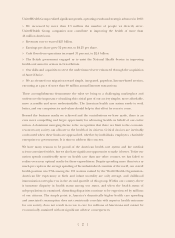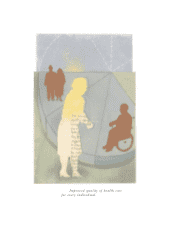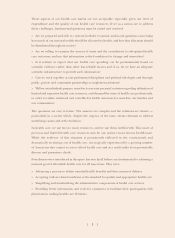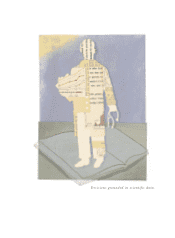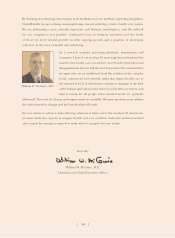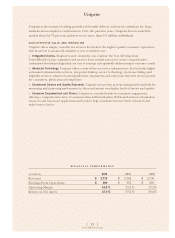United Healthcare 2002 Annual Report Download - page 6
Download and view the complete annual report
Please find page 6 of the 2002 United Healthcare annual report below. You can navigate through the pages in the report by either clicking on the pages listed below, or by using the keyword search tool below to find specific information within the annual report.
These aspects of our health care system are not acceptable, especially given our level of
expenditure and the quality of our health care resources. If we as a nation are to address
these challenges, fundamental questions must be raised and resolved:
> Are we prepared and able to confront both the economic and moral questions concerning
how much of our national wealth should be allocated to health, and how that allocation should
be distributed throughout society?
> Are we willing to examine the sources of waste and the contributors to sub-optimal health
care outcomes, and use that information as the foundation for change and innovation?
> Is it realistic to expect that our health care spending can be predominately based on
scientific evidence rather than other less reliable factors and, if so, do we have an adequate
scientific infrastructure to provide such information?
> Can we work together across professional disciplines and political ideologies and through
public, private and community partnerships to implement solutions?
> Will we as individuals prepare ourselves to exercise personal restraint regarding utilization of
limited and expensive health care resources, and demand the same of health care professionals,
in order to realize enhanced and cost-effective health outcomes for ourselves, our families and
our communities?
The questions are easy to frame. The answers are complex and the solutions are elusive —
particularly in a society which, despite the urgency of the issue, seems reluctant to address
underlying causes and seek resolution.
In health care, we use far too many resources, and we use them inefficiently. This waste of
precious and limited health care resources may be our nation’s most serious health issue.
While the evidence of this situation is prominently reflected in the continuously and
dramatically escalating cost of health care, it is tragically experienced by a growing number
of Americans who cannot access or afford health care and as a result suffer from preventable
disease and premature death.
Four themes were introduced in this space last year that I believe are fundamental to achieving a
national goal of affordable health care for all Americans. They were:
> Advancing a process to define essential health benefits and their means of delivery.
> Accepting evidence-based medicine as the standard for quality and appropriate health care.
> Simplifying and standardizing the administrative components of health care services.
> Providing better information and tools for consumers to facilitate their participation with
physicians in making health care decisions.
{ 5}



